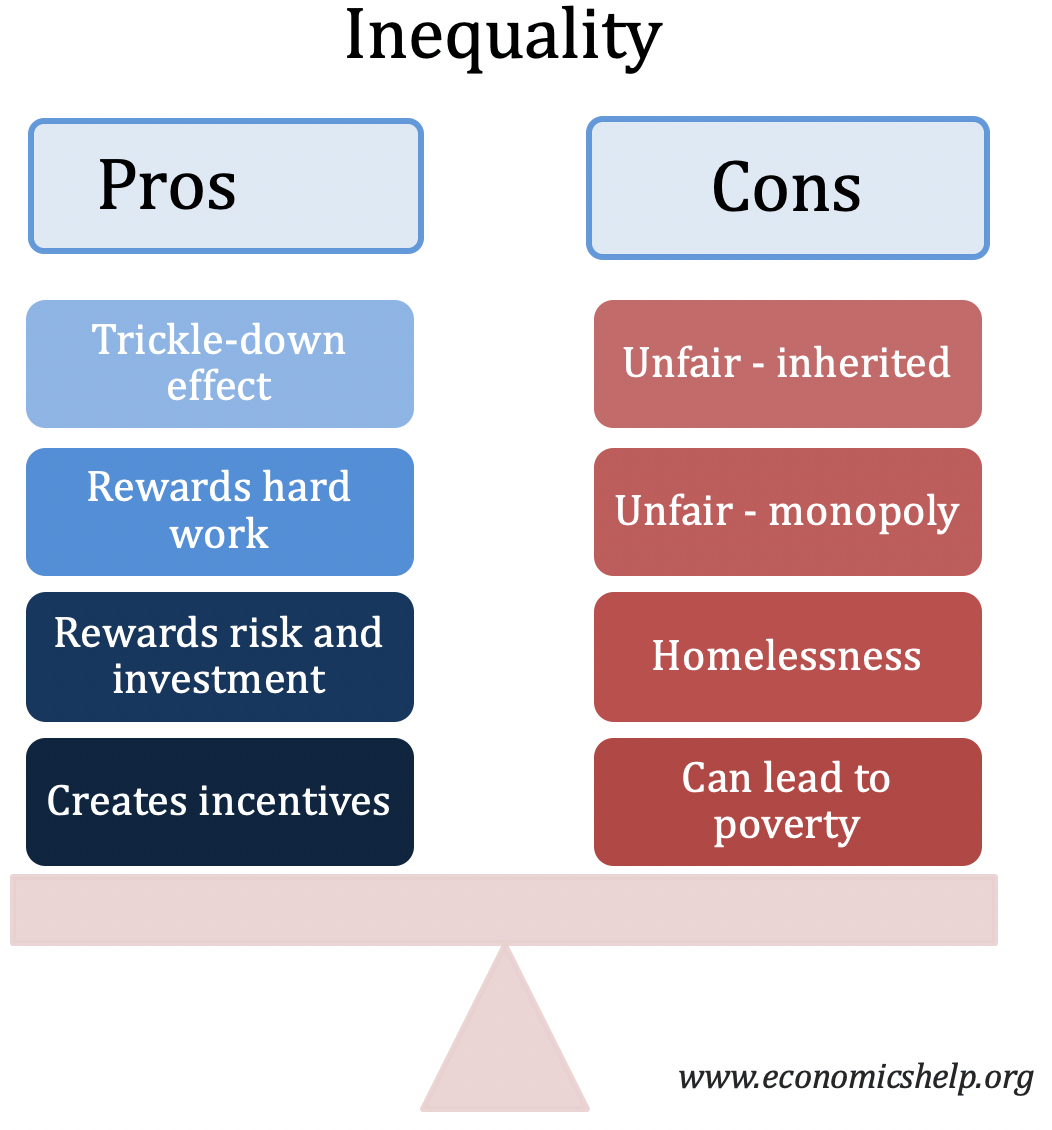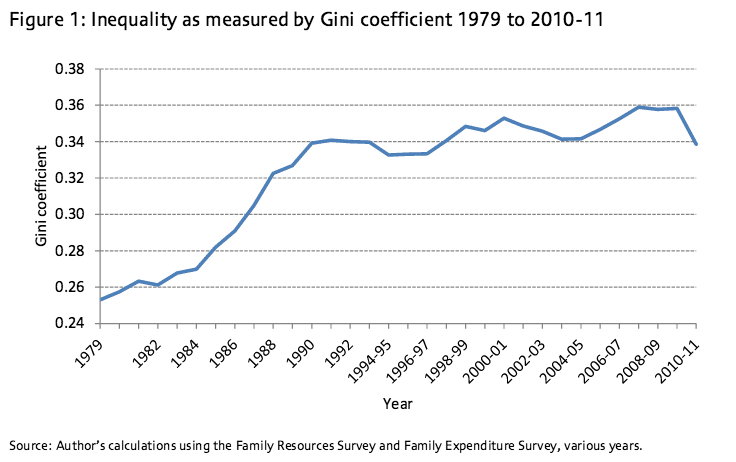Readers Question: ‘Society may come to the view that too much inequality is unacceptable or undesirable’ Assess whether inequality can cause economic problems, such as market failure. What are the advantages and disadvantages of inequality?
Inequality means there is a gap between the highest income earners and the lowest income earners. (inequality can also relate to wealth). On the one hand, you can argue inequality is necessary for providing incentives in a free market economy; without a degree of inequality, there would be economic stagnation and lack of enterprise. On the other hand, you could argue that inequality has many disadvantages and is evidence of fundamental problems in society.

Problems of Inequality
Arguably, inequality is a type of market failure. Market failure occurs when there is an inefficient allocation of resources in a free market. It can occur due to.
1. Inequality arising from monopoly power
If firms have monopoly power, they are in a position to set higher prices to consumers. This leads to a redistribution of income from consumers to the shareholders of monopolies. Here, the inequality is based on an unfair distribution of power in society. Even Adam Smith argued the government needed to regulate monopolies.
2. Inequality arising from Monopsony power
A monopsony occurs when a firm has market power in employing workers at a wage below the competitive equilibrium. It means the wage workers are paid will be lower than the marginal revenue product (MRP) of labour. This leads to an unfair distribution of income away from workers. Again the inequality arises from some firms having the power to set wage rates.
3. Diminishing marginal utility of income
Income has a diminishing marginal utility. The first £1,000 of income you earn gives substantial benefits. With this first £1,000, you can buy food to eat and contribute towards your rent and other basic necessities. Your first £1,000 has the highest utility because it is essential to maintain life and avoid absolute poverty. If you gain another £1,000 income this also increases your utility (satisfaction) because you can now buy better quality food and have improved shelter. But, the increase in utility is less than first £1,000
However, if you are a millionaire and gain an extra £1,000. The extra (marginal) utility is very limited. You can maybe buy a slightly more expensive car; you can buy a yacht that is 3ft bigger. But, the increase in utility/satisfaction is fairly limited.
Therefore increasing income equality can lead to an overall net gain because the poor see a bigger increase in utility than the loss faced by high earners.
4. Social Problems
Arguably inequality can lead to social friction. It can be a factor in precipitating riots or higher crime levels. In this case, all members of society lose out. This is more pressing if the inequality is perceived to arise out of unfair allocation of opportunities (e.g. inherited wealth, monopoly power)
5. Unemployment
The biggest cause of relative poverty is unemployment. Unemployment is considered a type of market failure because it represents an inefficient allocation of resources in a free market.
6. Inherited Wealth
Inherited wealth gives people an ‘unfair’ advantage in life. It may also make them lazy as they can live off rent, profit and dividends.
Advantages of Inequality
- Incentive effect. If someone works harder and as a consequence receives a higher wage then this is not market failure. The promise of a higher wage is essential to encourage extra effort. By rewarding hard work, there will be a boost to productivity leading to a higher national output – so everyone can benefit.
- Entrepreneurs require rewards. Inequality is necessary to encourage entrepreneurs to take risks and set up a new business. Without the prospect of substantial rewards, there would be little incentive to take risks and invest in new business opportunities.
- Trickle down effect. If some people gain extra income, then this can ‘trickle down’ to other people, e.g. if an entrepreneur sets up a business he may become a millionaire, but also will create jobs and provide incomes for other workers. There may be a gap between the highest and lowest earners. But, the lowest earners are still better off than without the entrepreneur. (more on trickle-down effect – which is quite controversial)
- Fairness. It can be argued that people deserve to keep higher incomes if their skills merit it. If a top footballer gets paid £100,000 a week, this is a reflection that people are willing to pay that kind of money to watch him.
What caused inequality?
When evaluating whether inequality is beneficial or not, it is important to know the causes of inequality. For example, if there is inequality of opportunity (e.g. people don’t have access to education) this is a bigger problem than if it is inequality arising from different skills and abilities.
Should we be concerned about a rise in inequality?

In the 1980s the UK (and the US) had a significant rise in inequality – as high-income earners benefitted more from the economic growth of that era. This inequality was also a reflection of increased financialisation – more income earnt from financial services, such as banking. The increased gap between wealth 1% and the poorest 10-20% is a source of social friction.
Related

this website was very helpful by the way.
On inherited wealth, isn’t that part and parcel of why people take risks to provide better for their families? It’s part of the incentive that promotes economic growth.
Great point.
Update your inequality graph to account for the year 2020….. then we will be concerned
The GINI coefficient is an inaccurate measure of inequality because it fails to account for the value of government benefits.
Why on earth are we deluged with articles on inequality and not on poverty? We can have all the benefits of inequality you mention:
Advantages of Inequality
Incentive effect.
Trickle down effect.
Fairness.
Without having poverty. It seems to me that poverty is the main problem and that we should be directly attacking it – as we frequently are – and we should be measuring effectiveness in reducing poverty not reducing inequality. I don’t care whether reducing poverty increases or decreases inequality. Think about whether you agree with me or not.
Because you can’t just end poverty. That’s why there are articles about income inequality. Plus, income inequality is a metric by which you can measure poverty since poverty is also relative. For example, if I live in Dubai and make $300,000 a year, but everyone around me makes $1,000,000+ annually, I am relatively poor since the rich will drive up all other expenses. And, in a capitalist society, it is impossible to end poverty without severe government overreach. How would you propose that we end poverty? Redistribution of wealth? That just gives the government control over the hard earned wealth of not just the 0.01%, or the 0.1%, or the 1%, but of everyone! The government can’t use its own money well (why do you think we are in $30 trillion debt??), so why on earth would we give it access to everyone’s personal bank account?
very helpful information